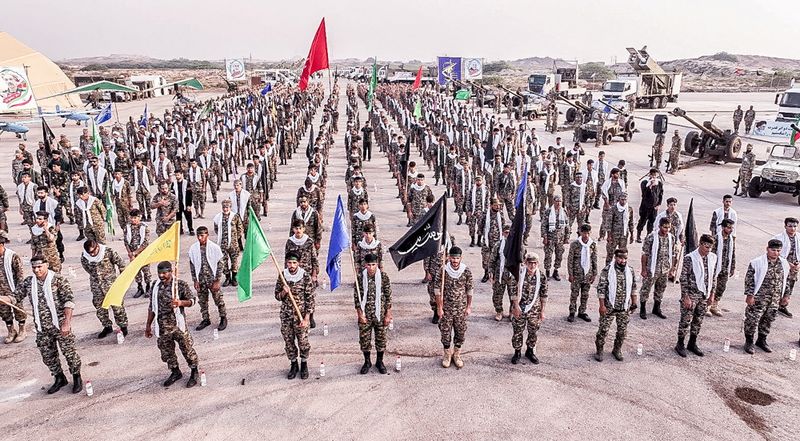Iran's Revolutionary Guards: powerful group with wide regional reach
Reuters
Published Aug 05, 2024 08:38AM ET
Updated Aug 05, 2024 10:02AM ET

DUBAI (Reuters) - Iran's elite Revolutionary Guards are likely to play a central role if the country retaliates for the assassination of its close ally Hamas leader Ismail Haniyeh in Tehran last week.
Following are some questions and answers about the Islamic Revolutionary Guard Corp (IRGC), Iran's dominant military force, which has its own army, navy, air force and intelligence wing.
WHAT IS THE IRGC?
It was set up shortly after the 1979 Islamic Revolution to protect the Shi’ite Muslim clerical ruling system and provide a counterweight to the regular armed forces.
The IRGC answers to Supreme Leader Ayatollah Ali Khamenei. The IRGC has an estimated 125,000-strong military with army, navy and air units. It also commands the Basij religious militia, a volunteer paramilitary force loyal to the clerical establishment that is often used to crack down on anti-government protests.
Basijs mounted “human wave” attacks against Iraqi troops during a war in the 1980s. In peacetime, they enforce Shi'ite Iran’s Islamic social codes. Analysts say Basij volunteers may number in the millions, with over 1 million active members.
The Quds Force is the IRGC's overseas arm , which heavily influences its allied militias across the Middle East, from Lebanon to Iraq, Yemen and Syria. Its members have fought in support of President Bashar al-Assad in Syria’s civil war and have backed Iraqi security forces in their battle against Islamic State militants in recent years.
The Quds Force handles Iran's relations with the "Axis of Resistance" composed of Tehran's Middle East proxies Hezbollah in Lebanon, Hamas in Gaza, Yemen's Houthis and armed groups in Iraq.
Commanders from Iran's Guards and Lebanon's Hezbollah group, sources told Reuters in January, were on the ground in Yemen helping to direct and oversee Houthi attacks on Red Sea shipping since Palestinian militant group Hamas' Oct. 7 attack on Israel, which triggered the war in Gaza.
The Guards' top commander, Major-General Qassem Soleimani, was killed by the United States in a drone attack in Iraq in 2020 that raised fears of a major conflict.
The IRGC, branded a terrorist group by the United States, has sought for years to shape the Middle East, according to Iran's interests. In 1982, it founded the heavily armed Shi'ite political movement Hezbollah in Lebanon as a vehicle to export Iran's Islamic Revolution and fight Israeli forces that had invaded Lebanon that year.
WHAT ARE THE IRGC’S MILITARY CAPABILITIES?
The IRGC oversees Iran’s ballistic missile programme, regarded by experts as the largest in the Middle East.
The Guards have used the missiles to strike Sunni Muslim militants in Syria and Iranian Kurdish opposition groups in northern Iraq.
The United States, European powers and Saudi Arabia blamed Iran for a 2019 missile and drone attack that crippled the world's biggest oil processing facility in Saudi Arabia, though Iran denied any involvement.
Former U.S. President Donald Trump pointed to Iran’s missile programme as one of the points not addressed in its 2015 nuclear deal with world powers and cited that as a reason for pulling out of the agreement in 2018.
The Guards have extensive conventional combat hardware and capabilities, which were showcased in their involvement in the conflicts in Syria and Iraq.
WHAT IS THE IRGC’S POSITION IN IRAN'S POLITICAL SYSTEM?
Former Revolutionary Guards officers occupy key positions in Iran's establishment, from the government to parliament. Most of former President Ebrahim Raisi's cabinet were former IRGC officers.
The IRGC’s mandate to protect revolutionary values has prompted it to speak out when it felt the system was threatened.
WHAT ABOUT BUSINESS INTERESTS?

After the 1980s war with Iraq, the IRGC became heavily involved in Iran’s reconstruction. It has since expanded its economic interests to include a vast network of businesses worth billions of dollars, ranging from construction and telecommunications to oil and gas projects.
(This story has been refiled to add the dropped word 'former' in paragraph 19)
Written By: Reuters
Trading in financial instruments and/or cryptocurrencies involves high risks including the risk of losing some, or all, of your investment amount, and may not be suitable for all investors. Prices of cryptocurrencies are extremely volatile and may be affected by external factors such as financial, regulatory or political events. Trading on margin increases the financial risks.
Before deciding to trade in financial instrument or cryptocurrencies you should be fully informed of the risks and costs associated with trading the financial markets, carefully consider your investment objectives, level of experience, and risk appetite, and seek professional advice where needed.
Fusion Media would like to remind you that the data contained in this website is not necessarily real-time nor accurate. The data and prices on the website are not necessarily provided by any market or exchange, but may be provided by market makers, and so prices may not be accurate and may differ from the actual price at any given market, meaning prices are indicative and not appropriate for trading purposes. Fusion Media and any provider of the data contained in this website will not accept liability for any loss or damage as a result of your trading, or your reliance on the information contained within this website.
It is prohibited to use, store, reproduce, display, modify, transmit or distribute the data contained in this website without the explicit prior written permission of Fusion Media and/or the data provider. All intellectual property rights are reserved by the providers and/or the exchange providing the data contained in this website.
Fusion Media may be compensated by the advertisers that appear on the website, based on your interaction with the advertisements or advertisers.